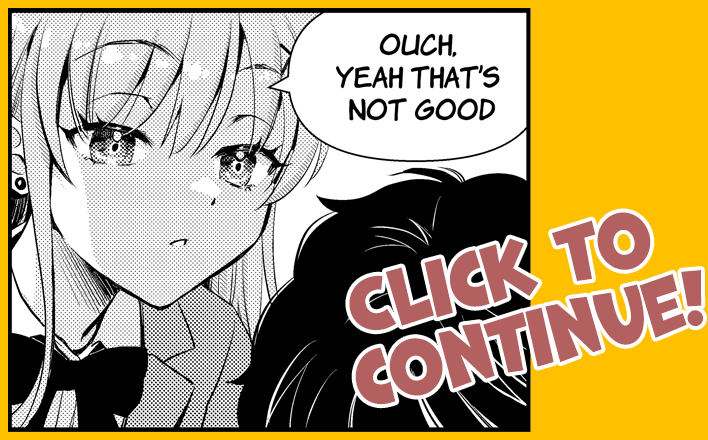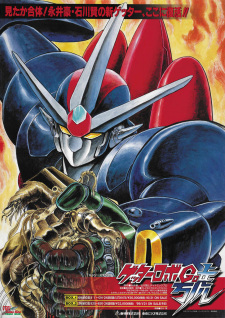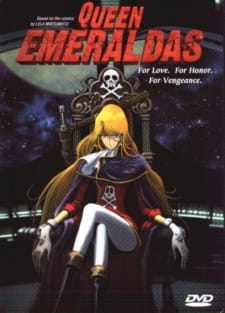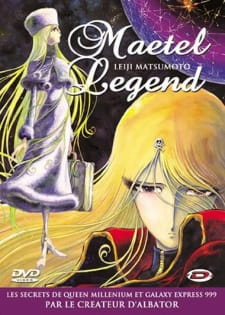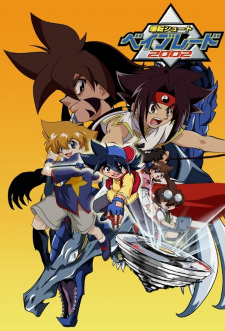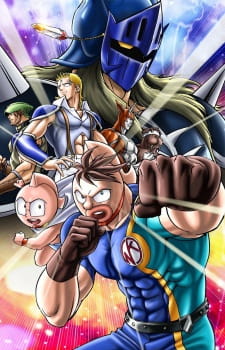Oct 18, 2014
New Century Legend Mars! Mars, the Legend of a New Century! The Legendary Mars in the New Century! Despite the awe-inspiring title, for years I've heard nothing but bad things about this 2002 show, ranging from "horrible animation" to "bad adaptation" and everything in-between. After finding the motivation recently, I finally sat down and watched this, and to spice things up, I did it while reading the manga side-by-side.
First, some background; the original five-volume manga was released in 1976 by Mitsuteru Yokoama - more on him in a bit - and it might surprise you to learn that this is actually the THIRD Mars
...
anime show! The first attempt to adapt this story was back in 1980, in the form of Six God Combination Godmars. Godmars is arguably the most popular version of the story, even though it has little to do with it; the only things in common are "alien kid named Mars betrays his original goal", "Gaia can blow up the Earth" and "six giant robot-gods". Everything else, from style to concept to tone, is really different, but no point in delving into details here. The second attempt was a two-part 1992 OVA, which would have been pretty solid had it been finished; unfortunately it adapts less than half the story in breakneck speed and ends on a cliffhanger. Ah well.
Back to Yokoyama - he is a somewhat well-known name in the old-school, trope-inventing pioneering sci-fi manga writers including the likes of Ishinomori, Tezuka and Nagai. In Japan, he is probably most well-known for creating the legendary Gigantor (Tetsujin #28) which was the first modern mecha show. In the west you might remember him as the guy behind the Giant Robo OVA from the 90s, which surprisingly isn't a straight adaptation of the Giant Robo manga as much as it's the culmination of -all- of Yokoyama's works, including the aforementioned Tetsujin, Babel II, the Water Margin and obviously, Mars. So to be as clear as possible - if you liked Giant Robo, you already have a reason to watch New Century God Mars, as it shows the origin of characters and mecha that appear there.
Also to be clear, if you HAVEN'T heard of Yokoyama or seen any of his other works, than you've got -little- reason to watch Mars. It hasn't aged well at all, and is basically out-done by any modern action series Shonen Jump can get their hands on. In other words, if you're looking for a good battle-driven show, you should probably look elsewhere, since this show (again, being a straight adaptation of the 70s comic book) really is just there to remind us of simpler times where plotpoints were easy to predict and narratives weren't as complex.
I don't usually do this when talking about shows but it's hard for me to distance the series from its source material. They are so intricately linked that the enjoyment of one will severely affect how you feel about the other. It's not like JoJo or Titans Attack or what-have-you where you could watch/read either version of the story and it wouldn't really matter (other than the occasional snob sneering at you). It's more like watching the 1998 version of Psycho - why bother if you're not gonna compare it to the source material? Because it's not very good on its own.
The story's as follows; due to underwater volcanic eruptions, a new island had emerged off the coast of Japan. Arriving by helicopter to cover the news, reporter Iwakura finds a young man standing there butt-naked. After being rescued, the young man's attending doctor (and his lovely daughter) soon discover that he's suffering from amnesia and has no idea who he is or how he got there. Enter Rush, another mysterious man who comes to tell our hero, which he refers to as Mars, his origins. Turns out Mars is a super-powered alien, and his purpose is to blow up the world using a giant robot! Like any normal person would, Mars asks Rush to give him some time to reconsider his mission. Unfortunately for Mars, Rush and his group, known together as "the Six Gods", are kind of in a hurry to destroy the world.
Thus begins Mars' journey filled with battles, self-discovery, and moral dilemmas! Will he choose to destroy the world? Or will he choose to defend it, even if it means facing off against the Sinister Six and their giant robots? You can probably guess the anime's answer, though the manga's abrupt ending might surprise you.
The anime's story covers all five manga volumes EXTREMELY faithfully... for the most part, anyway. The second half of episode 8 is devoted to a lengthy flashback detailing Mars' anime-only origin, which surprisingly enough doesn't really CONTRADCIT anything in the manga. Instead, I see it as more of a "reading-between-the-lines" thing. Later on, episode 12 continues that same flashback, but the most divisive difference comes in the final episode. Not to delve into spoiler-territory, suffice to say that the manga's aforementioned infamous ending is still there, but the anime follows it up by showing an epilogue which sort-of contradicts the manga version. It offers a more hopeful and optimistic final message, which I for one thought worked great. If you still insist on being a hardcore fan of the manga ending, just tell your head-canon that the final 10 minutes of the anime never happened and you're good to go!
My main gripe with this show, in fact, is that it follows the manga chapters TO THE LETTER. Other than the (fortunate) omission of three pointless "Robot vs. Hopeless Humans" battles, almost every scene in the manga is recreated shot-for-shot, which isn't really a good thing. As much as I like straight adaptations, I wouldn't have minded a more modern pacing, more dramatic elements, less predictable plot points and dialog... Bringing the show to the 21st century in general. It's akin to modern superhero movies – you go see them expecting something a bit better than the Golden Age era of silly Superman shenanigans. The OVA did a great modernization of (half) the story a decade prior, so it's a shame this version couldn't follow suit. It would have benefited from better character development, maybe showing their thoughts and feelings on what's right and wrong or what's the best course of action rather than being the two-dimensional cardboards they were. Even the enemies ended up just being nameless god-of-the-week, instead of actual intimidating adversaries a proper adaptation could have made them.
Speaking of characters... actually, there aren't that many. You've got Mars, our titular hero. For the first half of the show he is rather unlikable, mainly for being so naïve and speaking in clichés ("I will defeat you and save the planet!", "oh no, what will I do now?" etc.). Only later on when we hear his (again, anime-only) past, do we see a hint of an actual -character- behind the stereotypes. But most of the time he's just THERE, not really doing anything to move the plot along other than run away from evil robot gods. Things are happening around him but not because of him. In fact, you can probably sum up most of his episodes in a few sentences - Mars contemplates destruction; a robot appears and attacks people somewhere; Mars arrives but is totally helpless; he hides somewhere while Gaia shows up and stands still until the robot explodes. Rinse and repeat.
An anime-only character is introduced in the form of Muse. Thankfully, she only appears in visions so she doesn't interrupt the flow of the story. Basically, a minute is spent each episode showing her shouting at Mars "please stop the killing!" or "please don't die!" Later on we do get to see what her backstory is, but by the time you reach that point all you can think of is how irritating and pointless she is as a character. She is probably the worst story addition this show has made, on the count of how little she 'adds' to the story.
Then you've got the doctor and his daughter - starting the show, I really expected they'll become major players, but after episode 2, they were reduced to basically non-entities. They show up every now and then to act worried, provide exposition, and hear Mars babble. That's it. This show would have benefited from a MarsXHarumi development, but like many other things, it was another missed opportunity.
Then you've got the reporter Iwakura, who got the opposite expectation out of me - starting the show, I never thought we'd see him again, yet there he was each episode, stealing screentime with stuff the audience doesn't want to see nor care about. At first I thought it was cool to see the world's situation from your Average Joe's point of view, but then he got stuck in that damn room for FIVE EPISODES. That's almost half the show, in one room. We watch him grow a beard, we watch him learn a language. We literally watch him EAT HIS SHOES. I'm not even kidding - a minute or two are spent on him finding water and cooking his leather shoes because he got nothing else to eat, and it's played as neither a gag nor an important plotpoint! As if that's not bad enough, Episode 9 features Iwakura facing no less than FIVE different failed rescue attempts! Someone comes, he gets his hopes up, they're attacked and he's left in his desperation. Again and again, to the point where it's little more than a joke - especially when no one seems to be too upset about people being ray-beam'd to death all the damn time. Again, just another in a long list of things that might work in the manga but fall flat when animated, which the director should have realized. Speaking of whom...
The show's supervised by Yoshitaka Fujimoto. The guy's only real good hit was also his first - at only 21 years of age, he somehow got a gig directing some SPT Layzner episodes. Since than, other than storyboarding and episode-directing a lot, the only series-direction he did were some magical girl shows, some romcoms and some anime porn. Nothing noteworthy or memorable. Any Cat Girl Nuku Nuku fans here? No? Didn't think so.
So how well did this relative nobody do on Mars? You could probably guess at this point, but that's not necessarily his fault!
You see, Fujimoto did this show by having two small-time studios collaborate; Plum and Studio Guts are only known for their in-between animation and production assistance for other studios, and haven't really done ANY shows on their own before or since. As if it wasn't bad enough, seeing as it's 2002, they had to do this show digitally! In the immediate post-cel age, Japanese "digipaint" shows looked really bad, simply because the animation techniques weren't perfected yet. So in essence, whenever something needs to move, it's kept at the barest minimum of key frames. Backgrounds are simple, mostly with the same blue sky that's used over and over again. There is shading on people and objects, but only juuuuust enough so it won't look like a child's paper drawing. The color scheme is very bright and vibrant even when dealing with grim situations. When Mars' skin starts to rot midway through the show, instead of showing blisters or peeled-off skin or whatever, he looks exactly the same but brown, like he went to a really bad tanning salon (it looks REALLY weird). The show's definition of a "dynamic battle" is showing Gaia, our hero's robot, float around and spread its arms until the enemy suddenly goes up in flames. Characters look flat and static. To be fair, when comparing it to the original 1974 drawings, the show DOES look better, but that's not really saying much does it?
The character design itself manages to work in this setting, Mars retaining his distinctive long red hair, Harumi looking cutesy as ever and the bad guys look villainy enough. The mechanical design, however, is abysmal, and the worst offender is -- well, there's just no other way to say it --
Gaia looks stupid
There is no bigger selling point in a mecha show than the main character's robot, and no matter how you look at it, it was a mistake to leave Gaia looking like it did in the manga. All the robots look like children's toys and are hardly intimidating. They already HAD modern redsigns in 90s Mars and Giant Robo OVAs so it's even more frustrating than the other aforementioned bad choices this anime made (but still not as bad as watching that guy eat his shoes).
Music - nothing to write home about. The standard stuff for quiet scenes and some battle tracks, nothing memorable. I don't think a soundtrack album was even released. The intro song, Hanazono Kinema by Penicillin, however, is something else. Sounding much like a very bad American Idol audition by a wannabe poser, it's a rock song from a visual kei band with a heavy emphasis on the lead vocalist's nasal voice. It's gonna stuck in your head for months (or years, in my case) after you've first heard it. "An eternity" by ALLEY:A - the ending song - is nice track that grows on you after a while, but is otherwise forgettable.
Availability outside of Japan; AFAIK the show never got an official English release, but it does seem to have been released in France and in Latin America as "Mars the Terminator". As far as subs go, the only complete release as of 2014 are HK subs (for the uninformed, that usually means Japanese-to-Chinese-to-English translation with a very poor quality). It's cohesive and comprehensible enough (unlike, say, Getter Robo or Mazinger's Crabsticks), but you still get your bad grammar and weird naming choices like "Maz" and "Guya". Other than that, "Blue Fixer" fansubbed up to episode 10 and seem to have dropped it, while "Hokuto no Gun" are slowly releasing it every other month.
In summary;
Read and liked the manga? Good.
You want a loosely-connected reimagining? Watch Godmars (bearing in mind the show is overly long and unanimated; the compilation movie is a somewhat better choice)
You want a "darker" retelling with more modern story-telling techniques? Watch the 90s OVA (bearing in mind it's incomplete and unsubbed)
You want an adaptation? Watch this (bearing in mind it has horrible direction, is very much a product of its time, and has some hit-or-miss story additions)
You want a -good- adaptation? Maybe you should do what Mars did and lock yourself in a room until the time is right to awaken. Possibly the 2020s.
Reviewer’s Rating: 5
What did you think of this review?
Nice
 0
0
Love it
 0
0
Funny
 0
0
Confusing
 0
0
Well-written
 0
0
Creative
 0
0Show all



.png)

